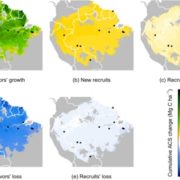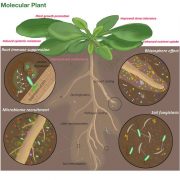Introducing curcumin biosynthesis in Arabidopsis enhances lignocellulosic biomass processing (Nature Plants)
 Lignin, polymerized from aromatic monolignols, provides strength to cell walls but its resistance to enzymatic degradation thwarts efforts to isolate cellulosic carbohydrates from cell walls for biofuels and other applications. It has been shown that lignin’s properties can be altered by the incorporation of other monomers. Here, Oyarce et al. have introduced genes for the synthesis of curcumin (from turmeric, Curcuma longa), which is structurally similar to the monolignol coniferyl ferulate, into Arabidopsis, and shown that the curcumin is incorporated into the lignin polymer. Curcumin introduces an alkali-labile bond into the lignin, providing a way to more easily remove lignin from plant tissues. The authors show that stem biomass and strength are not affected by the incorporation of curcumin, but that after akalki treatment, glucose release from the engineered plants is significantly increased. (Summary by Mary Williams) Nature Plants 10.1038/s41477-018-0350-3
Lignin, polymerized from aromatic monolignols, provides strength to cell walls but its resistance to enzymatic degradation thwarts efforts to isolate cellulosic carbohydrates from cell walls for biofuels and other applications. It has been shown that lignin’s properties can be altered by the incorporation of other monomers. Here, Oyarce et al. have introduced genes for the synthesis of curcumin (from turmeric, Curcuma longa), which is structurally similar to the monolignol coniferyl ferulate, into Arabidopsis, and shown that the curcumin is incorporated into the lignin polymer. Curcumin introduces an alkali-labile bond into the lignin, providing a way to more easily remove lignin from plant tissues. The authors show that stem biomass and strength are not affected by the incorporation of curcumin, but that after akalki treatment, glucose release from the engineered plants is significantly increased. (Summary by Mary Williams) Nature Plants 10.1038/s41477-018-0350-3









